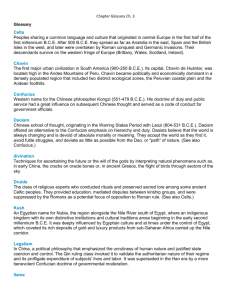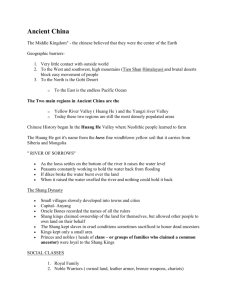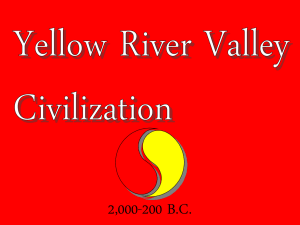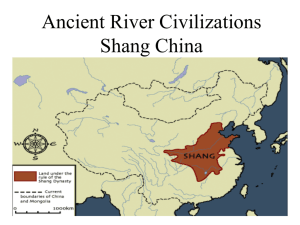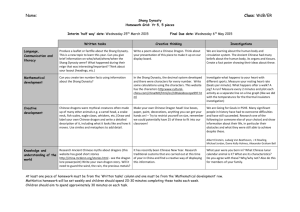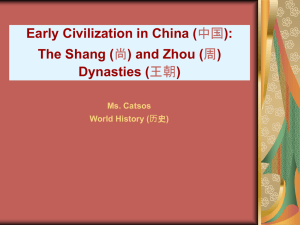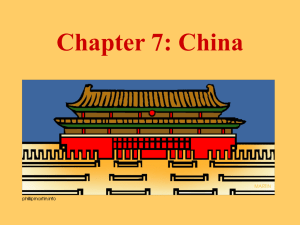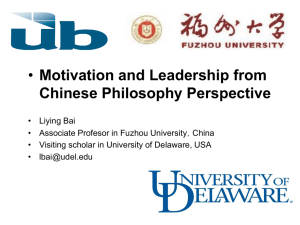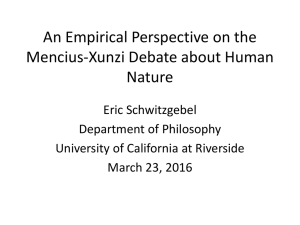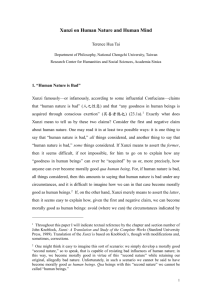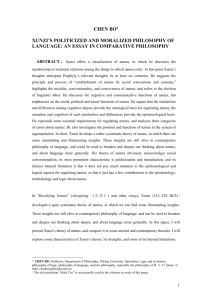ChinaX 01 - discussion prompts
advertisement
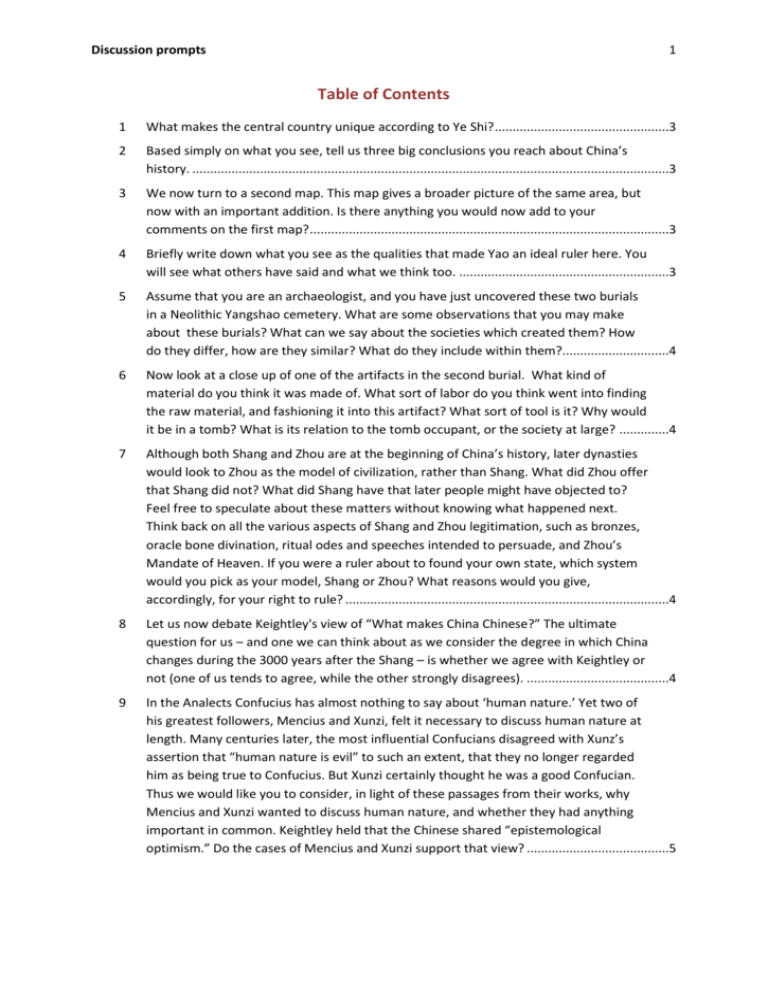
Discussion prompts 1 Table of Contents 1 What makes the central country unique according to Ye Shi? .................................................3 2 Based simply on what you see, tell us three big conclusions you reach about China’s history. ......................................................................................................................................3 3 We now turn to a second map. This map gives a broader picture of the same area, but now with an important addition. Is there anything you would now add to your comments on the first map? .....................................................................................................3 4 Briefly write down what you see as the qualities that made Yao an ideal ruler here. You will see what others have said and what we think too. ...........................................................3 5 Assume that you are an archaeologist, and you have just uncovered these two burials in a Neolithic Yangshao cemetery. What are some observations that you may make about these burials? What can we say about the societies which created them? How do they differ, how are they similar? What do they include within them?..............................4 6 Now look at a close up of one of the artifacts in the second burial. What kind of material do you think it was made of. What sort of labor do you think went into finding the raw material, and fashioning it into this artifact? What sort of tool is it? Why would it be in a tomb? What is its relation to the tomb occupant, or the society at large? ..............4 7 Although both Shang and Zhou are at the beginning of China’s history, later dynasties would look to Zhou as the model of civilization, rather than Shang. What did Zhou offer that Shang did not? What did Shang have that later people might have objected to? Feel free to speculate about these matters without knowing what happened next. Think back on all the various aspects of Shang and Zhou legitimation, such as bronzes, oracle bone divination, ritual odes and speeches intended to persuade, and Zhou’s Mandate of Heaven. If you were a ruler about to found your own state, which system would you pick as your model, Shang or Zhou? What reasons would you give, accordingly, for your right to rule? ...........................................................................................4 8 Let us now debate Keightley's view of “What makes China Chinese?” The ultimate question for us – and one we can think about as we consider the degree in which China changes during the 3000 years after the Shang – is whether we agree with Keightley or not (one of us tends to agree, while the other strongly disagrees). ........................................4 9 In the Analects Confucius has almost nothing to say about ‘human nature.’ Yet two of his greatest followers, Mencius and Xunzi, felt it necessary to discuss human nature at length. Many centuries later, the most influential Confucians disagreed with Xunz’s assertion that “human nature is evil” to such an extent, that they no longer regarded him as being true to Confucius. But Xunzi certainly thought he was a good Confucian. Thus we would like you to consider, in light of these passages from their works, why Mencius and Xunzi wanted to discuss human nature, and whether they had anything important in common. Keightley held that the Chinese shared “epistemological optimism.” Do the cases of Mencius and Xunzi support that view? ........................................5 Discussion prompts 2 10 Suppose you had the power to rebuild society after it was destroyed. Which thinker among the Confucians or the Hundred Schools masters would you rely on in your effort to rebuild society? Why? ................................................................................................6 11 The Chinese writing system (and its use of “characters”) is a unique element of Chinese civilization. Based on the modules we’ve covered so far, how has writing influenced the political and intellectual foundations of China? .................................................................6 Discussion prompts 1 3 What makes the central country unique according to Ye Shi? It is clear that Ye Shi prides the Zhong guo as being principled, and therefor superior to the tribal peoples surrounding the Central States. However, his argument may be flawed to some extent. What if each of those tribal peoples have principles of their own that - unfortunately - do not coincide with the lofty principles ruling the Zhong guo? It appears that the sheer might of the Central states has made it impossible to conceive this particular notion. Although Ye Shi allows for change according to the situation, that only really pertains to saving the assets of the Zhong guo if necessary, while allowing for submission of the tribal peoples - who will then still be regarded as being outside the Zhong guo. A pretty sweet deal for the Central states and the short end of the stick for the tribal peoples, I suppose ... 2 Based simply on what you see, tell us three big conclusions you reach about China’s history. After an initial period of assertion in the core areas (corresponding to the most populated areas today south of the line from Yunnan to Beijng), a waxing and waning movement seems to characterise the development. Invasions of tribal peoples (I’m assuming that the red areas indicate ‘barbarian’ dynasties) is always followed by a reassertion of the ‘locals’ within a shortish period of time and the removal of the foreign dynasty over time. China seems to have had a consistent taste for a route to the west, along the silk route. This might be a wish to control that trade for their own benefit, or simply a way to secure proper use of the trade route. 3 We now turn to a second map. This map gives a broader picture of the same area, but now with an important addition. Is there anything you would now add to your comments on the first map? The simplification of map one has been augmented with overlapping territories. This probably indicates some kind of diplomatic relationship or control over other groups of people. There is also an obvious ‘shoving away’ movement that usually starts from the fertile central areas and gradually pushes out ‘barbarians’ in order for the ruling dynasty to (re)occupy the fertile lands. 4 Briefly write down what you see as the qualities that made Yao an ideal ruler here. You will see what others have said and what we think too. Yao was considered an ideal ruler for being intelligent and creative, sincere in his goals and well-organised in the way he introduces and elaborates his ideas. Discussion prompts 5 4 Assume that you are an archaeologist, and you have just uncovered these two burials in a Neolithic Yangshao cemetery. What are some observations that you may make about these burials? What can we say about the societies which created them? How do they differ, how are they similar? What do they include within them? The two burials have a very different level of elaboration: this could be indication of a stratified society with a clear separation in wealth and probably influence. However, they clearly belong to the same culture: the bodies have been posed very similarly, on their back. 6 Now look at a close up of one of the artifacts in the second burial. What kind of material do you think it was made of. What sort of labor do you think went into finding the raw material, and fashioning it into this artifact? What sort of tool is it? Why would it be in a tomb? What is its relation to the tomb occupant, or the society at large? The artefact appears to be a stone tool of sorts, most likely an adze. It is a tool that takes a lot of time and experience to make and would be of considerable value. Also, it might be regarded as a highly personal object. As a burial object, it could indicate the occupation of the deceased person, or a sign of reverence to their art. 7 Although both Shang and Zhou are at the beginning of China’s history, later dynasties would look to Zhou as the model of civilization, rather than Shang. What did Zhou offer that Shang did not? What did Shang have that later people might have objected to? Feel free to speculate about these matters without knowing what happened next. Think back on all the various aspects of Shang and Zhou legitimation, such as bronzes, oracle bone divination, ritual odes and speeches intended to persuade, and Zhou’s Mandate of Heaven. If you were a ruler about to found your own state, which system would you pick as your model, Shang or Zhou? What reasons would you give, accordingly, for your right to rule? Zhou has a legitimation that goes beyond the idea of good governance or lineage, it has received a positive legitimation directly from heaven. This does not take away the earlier importance of legitimation, but it adds an important extra bit. I would also imagine that the idea of “temporary legitimation until things go wrong” would be attractive to the population who additionally is considered to have some importance as the eyes and ears of the heavens when it comes to take a decision about the rightfulness of the mandate. While Shang had a way of influencing the ancestors, and thereby the gods themselves, that influence was clearly to the benefit of the rulers, and only indirectly to the benefit of the population. The Zhou were indirectly dependent on the people they ruled, which made their rule much more digestible as it appeared to reflect the will of the population. 8 Let us now debate Keightley's view of “What makes China Chinese?” The ultimate question for us – and one we can think about as we consider the degree in which Discussion prompts 5 China changes during the 3000 years after the Shang – is whether we agree with Keightley or not (one of us tends to agree, while the other strongly disagrees). The undoubtedly learned articles makes a good point in highlighting the differences between ancient Greece and a comparable ear in Chinese early history. Indeed, there are differences in world view, religious practices and beliefs, state organisation, etc. But the characteristics given to the Chinese are not necessarily purely Chinese. The could apply to other peoples and cultures to a varying degree as well. Furthermore, not all Greeks enjoyed the same kind of government and culture, although there is clearly a common basis to all their iterations of cultural differences. Still: the determinations made in the article have stuck a cord and given me some hints on how to explain observations I had previously made in acquaintances of Chinese origin: a certain uniformity of character, a specific way of talking and thinking about family members especially elderly ones, and a lot of small and barely noticeable ways that set them apart and that are part of the characteristics that I have started to think of as "Chinese". 9 In the Analects Confucius has almost nothing to say about ‘human nature.’ Yet two of his greatest followers, Mencius and Xunzi, felt it necessary to discuss human nature at length. Many centuries later, the most influential Confucians disagreed with Xunzi’s assertion that “human nature is evil” to such an extent, that they no longer regarded him as being true to Confucius. But Xunzi certainly thought he was a good Confucian. Thus we would like you to consider, in light of these passages from their works, why Mencius and Xunzi wanted to discuss human nature, and whether they had anything important in common. Keightley held that the Chinese shared “epistemological optimism.” Do the cases of Mencius and Xunzi support that view? I would say that Mencius and Xunzi have the basic concept in common: rituals are needed to make sure that society works and that everyone has the capacity to humaneness. They do differ, however, in their approach to human nature. While Mencius sees humaneness as something that comes with the package of being human, with instinct and ritual working in unison, Xunzi sees humaneness as something achieved by following rituals to counteract an innate evil nature and to create order. Confucius himself may not have been all that concerned about this part of the equation of “human nature”, but in the times of Mencius and Xunzi, society had taken a turn for the worse and human nature as such has become a much more important aspect that needed to be highlighted. As for the question of epistemological optimism, I see this in Xunzi’s notion of struggle to become humane (everyone can achieve this, given the right stimulus and role models), while Mencius seems unconcerned with the concept as such, because for him instinct and ritual were working in unison and needed not be known as such. Discussion prompts 10 6 Suppose you had the power to rebuild society after it was destroyed. Which thinker among the Confucians or the Hundred Schools masters would you rely on in your effort to rebuild society? Why? I guess, my decision would depend on my own role in this new society. If I were to be a ruler (or wanted to become one), I would probably go with Han Fei as that decision would give me certainty to have the best possible officials by trial and error, while brining into the government a lot of knowledge of subjects I might not necessarily be familiar with. As a subject, however, I would most likely favour Laozi as it would allow me to get sorted by myself in order to live a good life, to use and develop my own skills, and thereby indirectly be advantageous to society as a whole. Coming back to the ruler role: the very best option would – clearly – be a two-pronged one: apply Laozi’s principles to all, promote the ones that show promise to public service and make use of their skills and capabilities. 11 The Chinese writing system (and its use of “characters”) is a unique element of Chinese civilization. Based on the modules we’ve covered so far, how has writing influenced the political and intellectual foundations of China? The Chinese characters were always closely associated with Chinese civilization and power. They were also very useful to convey information not just amongst speakers of Chinese, but due to their non-language-specific character - also amongst speakers of other languages. In view of the contraction and expansion of the Empire's sphere of influence, this tool could always be relied upon to create connections, but also make newly incorporated peoples feel part of a 'whole' from day one.
